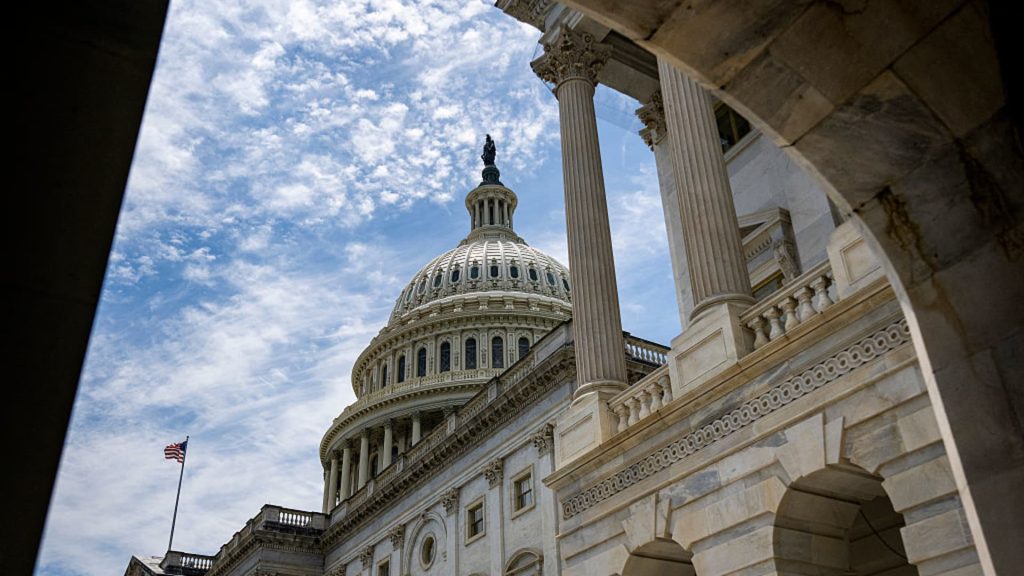A view of the US Capitol in Washington, DC, on June 30, 2025.
Jim Watson | Afp | Getty Images
The wealthy will likely see a host of new tax breaks in President Donald Trump’s “big beautiful bill,” along with permanent extensions of many of the 2017 tax cuts, according to tax experts.
Taxpayers earning $1 million or more are expected to see a boost in after-tax income of about 3% in the Senate version of Trump’s bill, according to the Tax Policy Center. That compares with the nationwide average of about 2.5%. In dollar terms, millionaire earners will see an average after-tax income increase of $75,000 in 2026, according to the Tax Policy Center.
Virtually all the core provisions of the 2017 tax cut are expected to be extended in the final bill, which was passed in the House on Thursday and now heads to Trump’s desk, with some provisions becoming permanent. There are also several new tax breaks or benefits added in the bill that further lower tax bills for those at the top — especially for investors in small businesses.
Here are the five most important changes in the bill that affect high earners and the wealthy.
SALT
Surprisingly, the Senate bill largely follows the House’s version of the state and local tax, or SALT, cap increase. The existing $10,000 cap on SALT deductions will rise to $40,000 for those making less than $500,000, with the income threshold rising 1% a year. Initially the Senate was opposed to a change that largely benefits blue-state top earners. Yet after threats from the House, the Senate agreed to the $40,000 level.
Unlike the original House version of SALT, however, the Senate bill preserves a popular loophole to get around the cap. Dozens of states allow a workaround, called the pass-through entity tax, or PTET, that encourages pass-through owners and partners to avoid the cap at the state level. It benefits everyone from car dealers and dentists to accounting and law partners, but not employees of those firms.
The initial House version of the bill eliminated the loophole benefit for service industries and most white-collar firms, such as accountants, lawyers and doctors, according to Kyle Pomerleau at the American Enterprise Institute. Yet the Senate didn’t follow the House change.
“The Senate version has no limitation on the workarounds,” Pomerleau said, “effectively allowing these taxpayers to utilize an unlimited SALT deduction.”
Qualified small business stock benefit
Entrepreneurs and investors in small businesses will cheer a change in qualified small business stock, or QSBS. Created during the Clinton administration and expanded under President Barack Obama, the program is designed to encourage investments and creation of small companies. Under current law, investors or owners of a qualifying C Corp for more than five years get reductions in capital gains taxes when they sell. A qualifying company is defined as a “small business” if its total assets are $50 million or less. When a business is sold, owners or investors are exempt from capital gains taxes up to $10 million, or 10 times the original basis of the investment, whichever is greater.
The Senate bill raises the threshold to qualify as a “small business” from $50 million to $75 million. It also increases the exclusion from $10 million to $15 million, and it creates a new, tiered system for allowing tax breaks for those who want to sell before five years.
Justin Miller, partner and national director of wealth planning at Evercore, said the new rules would allow an investor to put $74.9 million into a small business and have up to $749 million exempt from capital gains if it sold for more than 10 times the original basis.
“It’s encouraging wealthy investors in qualified small businesses with enormous potential,” Miller said.
Estate and gift tax
Like the version the House put forward, the Senate bill makes the estate tax permanent, which in Washington means it won’t have a built-in expiration date. The exemption would increase to $15 million per estate or $30 million for couples, and the exemption will be indexed for inflation.
For the ultra-wealthy, the estate tax is the most important of all the major tax code provisions. So having some stability, at least until the next election, will make for calmer estate planning and gifts.
Itemized deductions
The Senate bill includes a limit on the value of itemized deductions that was also included in the original House bill. Only about 10% of Americans — mostly the wealthy — still itemize their taxes, since the standard deduction is now $15,000 for single filers and $30,000 for joint filers. Under both the House and Senate versions, taxpayers in the top bracket will have to subtract 2/37th from the value of each dollar deducted over the threshold. The net effect is that top taxpayers will only get a deduction benefit of 35 cents for every dollar, rather than 37 cents.
Philanthropy
There’s good news and bad news for charitable giving, depending on your income level. For lower- and middle-income earners, the Senate bill includes a provision to encourage more charitable giving by the 90% of Americans who no longer itemize. The 2017 tax cuts doubled the standard deduction, eliminating the incentive for the vast majority of taxpayers to itemize and claim the charitable deduction. The Senate bill allows taxpayers to take the standard deduction and still claim a charitable deduction of up to $1,000 for single filers and $2,000 for married joint filers.
Yet for wealthy donors, who now account for the majority of charitable giving, the Senate bill is decidedly uncharitable. It decreases the value of the charitable deduction for high-income taxpayers by capping itemized deductions and sets a new floor of 0.5% of adjusted gross income for the itemized charitable deduction.
So someone with $1 million in adjusted gross income wouldn’t get a tax break on the first $5,000 of donations.

